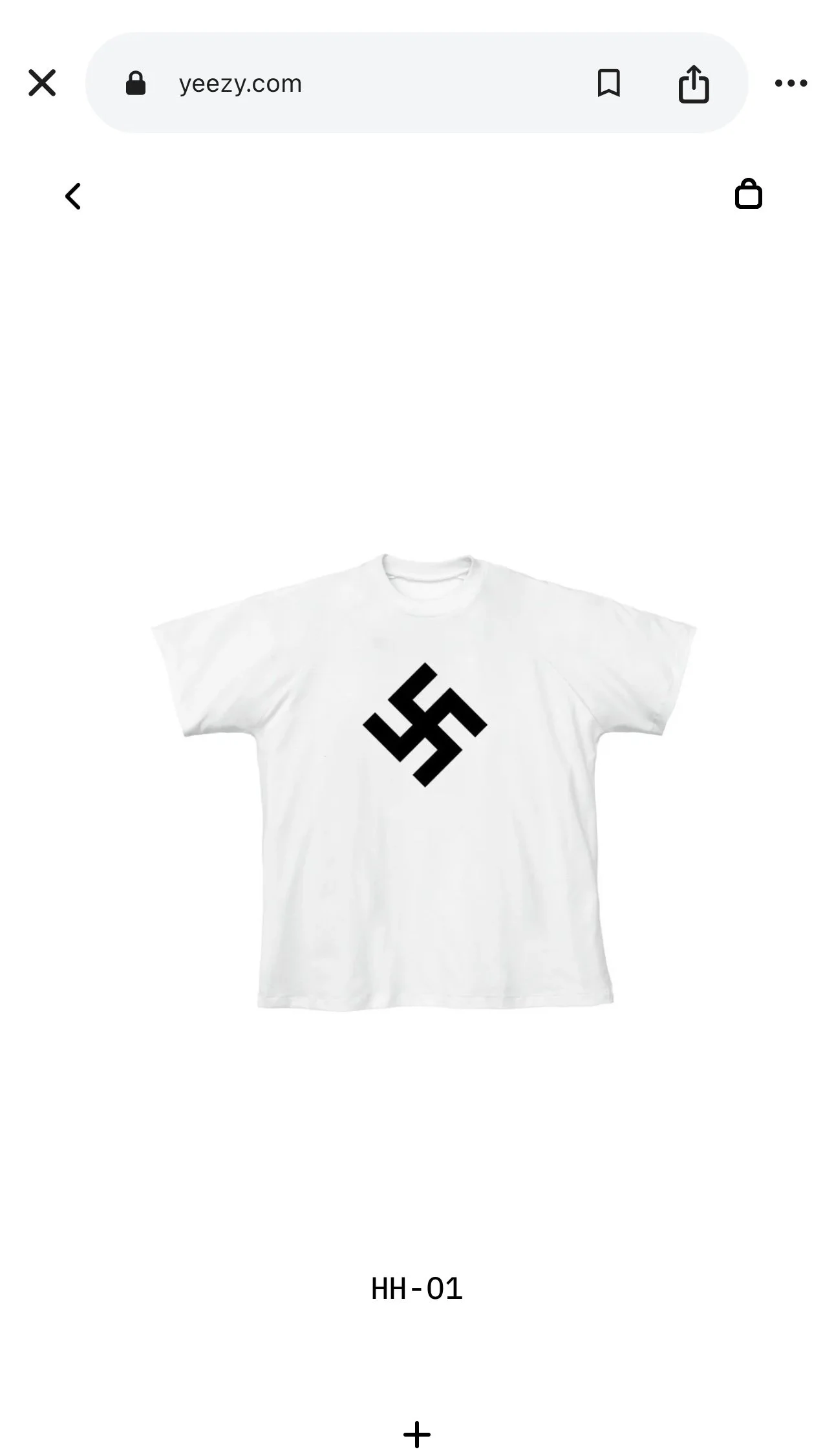Is It Finally Over for Kanye?
The industry moves the goalposts. After years of inflammatory remarks and open admiration for Hitler, it is hard to believe we are still debating whether Kanye West’s career is over. Yet, there he was at the 2025 Grammy Awards, standing on the red carpet like nothing had happened.
Then, just days later, he took things even further, using a Super Bowl ad to promote swastika-emblazoned merchandise.
Kanye’s history of antisemitism is not new. In December 2022, during an interview on Alex Jones’s InfoWars, he openly praised Hitler, stating, “I see good things about Hitler.” He even denied the Holocaust. Now, in 2025, he has doubled down, posting a fresh string of antisemitic rants on X (formerly Twitter) and selling Nazi-themed merchandise.
It blows my mind that an artist who has openly declared himself a Nazi was welcomed at music’s biggest night. Even more shocking is that Chris Brown, an artist with a long history of violent behaviour, won a Grammy this year and was later seen at Kanye’s Grammys after-party, as if none of this was happening.
Meanwhile, I personally know of public figures who have been quietly uninvited or outright banned from events for practically nothing in comparison. The double standard is astonishing.
The Market for Hate
West’s latest controversy, a Super Bowl ad directing viewers to his website where he was selling a £20 T-shirt featuring a swastika, sparked widespread outrage. The shirt, labelled HH-01, is believed to reference Heil Hitler, a common shorthand among neo-Nazi groups, according to the Anti-Defamation League. The fact that it was his only available product suggests it was not a coincidence.
The real shock, however, is that people bought it. Reports suggest his £8 million Super Bowl ad generated £2 million in sales almost instantly. That means 100,000 people willingly purchased a shirt emblazoned with one of history’s most infamous hate symbols. This is no longer just about Kanye self-sabotaging. It is about him deliberately stoking a movement and profiting from it.
Why Is Kanye Still Here?
Historically, public figures who dabble in extremism tend to vanish. Mel Gibson was exiled from Hollywood for a decade after his antisemitic rant. Kevin Spacey’s career was obliterated over sexual assault allegations. And yet, Kanye, who has called himself a Nazi, praised Hitler, and now actively sells Nazi-themed merchandise, is still standing. Why?
The answer is twofold: money and selective cancellation.
The entertainment industry is built on reinvention. Time and again, people claw their way back from cancellation once the public loses interest. But Kanye’s case is different. He isn’t quietly rebuilding his reputation. He is doubling down. His three-day spree of antisemitic posts on X (formerly Twitter) was so extreme that even Elon Musk, who prides himself on free speech absolutism, banned him. Yet, despite being removed from platforms, he simply moves elsewhere. The music industry still hasn’t fully cut ties. Events like the Grammys still let him in. And as long as he can find an audience willing to listen, he remains relevant.
This isn’t just about industry enablers. It is about the people still willing to buy into his narrative.
The Psychology of Kanye’s Fanbase
Cognitive dissonance plays a huge role in why people continue to support Kanye. When fans have invested years in idolising an artist, admitting he is beyond redemption feels like a personal betrayal. They rationalise. He is misunderstood. He is trolling. He is a free thinker being silenced. But at what point do we stop pretending this is a performance and start acknowledging that some things are not just controversial. They are indefensible.
The Double Standards of Cancellation
The inconsistency of cancel culture is staggering. Some people are wiped from public life over minor infractions, while others can repeatedly push the boundaries of hate speech and still be allowed back in.
Would a female artist survive half of what Kanye has done? If Taylor Swift went on an antisemitic rant tomorrow, would she be given the same leniency? If a Black female artist praised Hitler, would we be debating their downfall or watching them disappear overnight?
Then there is Chris Brown, a man with a documented history of violence against women, who won a Grammy in 2025. The fact that he was not only present but embraced Kanye should tell you everything you need to know about how selective the industry’s so-called accountability is.
I cannot comprehend how the same industry that shunned artists for problematic tweets or reputations for being difficult is rolling out the red carpet for someone openly aligning with Nazi ideology. I know public figures who have been blacklisted for far less. Some, for things that are not even scandals in the first place. Kanye and Chris Brown are apparently where the industry draws the line.
Is This Finally It?
History has a pattern of turning once-revered figures into cautionary tales. The question is not whether Kanye will be remembered. It is what he will be remembered for. At this point, his legacy is shaping up to be less about his music and more about how far someone can push the boundaries of public decency before consequences finally catch up.
Kanye’s greatest weapon has always been his ability to make people talk about him. The moment that stops, he is done. The only question now is whether the world is finally ready to move on or whether we are still giving him the attention he thrives on, even if it is for all the wrong reasons.
